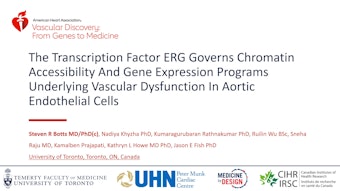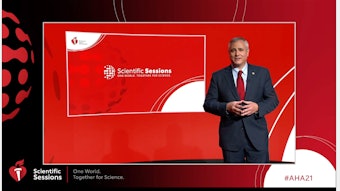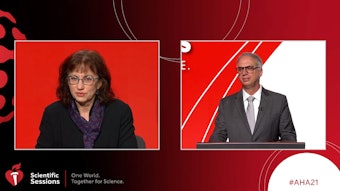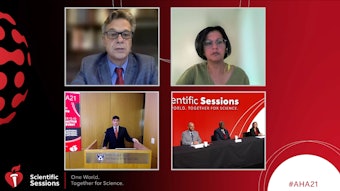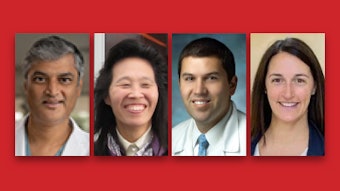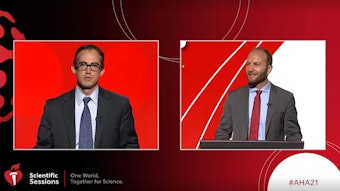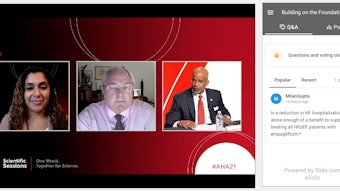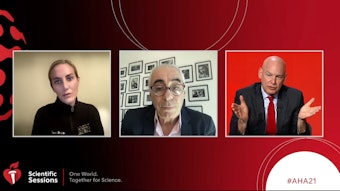The shifting profile of cardiopulmonary COVID-19 survivors
Cardiology community assesses current data and the unknown.
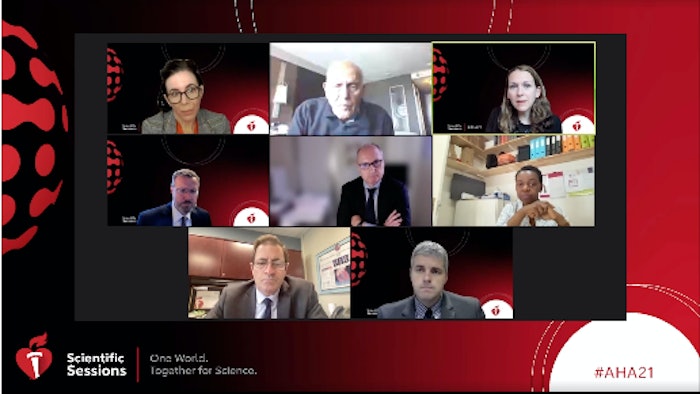
The cardiology community is braced for change, as it navigates a shift in the clinical profile of the cardiopulmonary health in patients who survived COVID-19 and have joined the ranks of “long haulers.”
That shift and its implications across clinical, social, racial, economic and demographic boundaries was the basis of Monday’s panel session, “Long-Term COVID-19: Cardiopulmonary Translational Science.”
“There are so many unknowns. It continues to tax everybody and needs to be addressed as we go along with this pandemic,” said Magdi Yacoub, OM, FRS, who moderated the panel discussion. Dr. Yacoub is a retired professor of cardiothoracic surgery at Imperial College in London.
While questions remain, panelists focused on the information they have gathered. In particular, panelists discussed the long-term complications of COVID-19 due to cardiac impairment, vascular thrombosis and autonomic dysfunction.
Ana Mocumbi, MD, PhD, FESC, associate professor of cardiology at Universidade Eduardo Mondlane in Mozambique, presented on the biventricular cardiac complications of COVID-19. Specifically, Dr. Mocumbi said right ventricular dysfunction and failure is more common than left-sided disease. As such, she underscored the need for additional studies in low-income settings with high occurrence of isolated or predominant right heart failure.
Two panelists discussed the thrombotic and microthrombotic pulmonary complications of long-term COVID-19. In part one of the discussion, Mark T. Gladwin, MD, FAHA, chair of the department of medicine at the University of Pittsburgh, assessed the overall impact of a respiratory viral infection on cardiopulmonary health. Although a thrombosis diagnosis resulting from a viral, respiratory infection increases the risk of myocardial infarction, stroke and deep vein thrombosis/pulmonary embolism (DVT/PE), Dr. Gladwin said a flu vaccine offers protection against the risks of major cardiovascular events that may occur during the viral illness.
In looking at the therapeutic pathways for thrombotic and microthrombotic complications of long-term COVID-19, William Bain, MD, assistant professor of medicine at the University of Pittsburgh, discussed the use of anticoagulation treatments. Specifically, he reviewed the treatment for patients hospitalized with moderate and severe COVID-19 as well as the impact on recovery after a patient has been discharged.
According to Dr. Bain, anticoagulation therapy has shown a small benefit for moderately ill patients hospitalized for COVID-19, while such therapy provides no benefit and may possibly harm patients who have been hospitalized with severe COVID-19. Further, he said, there is no known benefit to anticoagulation therapy for COVID-19 survivors diagnosed with thrombosis in the post-discharge setting.
Gregory Lewis, MD, a cardiologist, and medical director of the Cardiac Transplantation Program at Massachusetts General Hospital in Boston, led the discussion on the impact of long-term COVID-19 and autonomic dysfunction. The long-term effects of COVID-19 overlap with autonomic dysfunction, presenting symptoms of fatigue, headache, cognitive impairment and a host of other clinical conditions. Interestingly, Dr. Lewis said more female, long-term COVID-19 survivors are predisposed to autonomic dysfunction with orthostatic intolerance. According to Dr. Lewis, it may be due to women having one-third less skeletal muscle mass, smaller hearts and are more prone to pelvic venous pooling and autoimmune disease.
Aside from the clinical findings of the long-term effects of COVID-19 on survivors, Karen Joynt Maddox, MD, MPH, FAHA, an assistant professor and co-director of the Center for Health Economics and Policy at Washington University in St. Louis explored the impact of social determinates on the cardiopulmonary health profile of patients. Certain patients are further limited by access to health care. Many of these patients are likely to present with non-specific clinical complaints and multisystem involvement, Dr. Maddox said.
A higher burden of COVID-19 in socially at-risk groups is due to individual and structural reasons, she said, including the incidence of disease (workplace exposure, comorbidities, behavior), access to testing and treatment, hospitalization (seeking care later and hospital bed shortages) and overall mortality.
When asked by Dr. Yacoub about whether patients with poor socio-economic circumstances “suffer more or less” than those without that burden, Dr. Maddox said it remains to be seen, due to the lack of broad reporting across registries and the inability to find a common denominator to date. Ultimately, Dr. Maddox said, researchers continue to evaluate a patient’s prognosis based on access to quality health care versus underlying biology.


